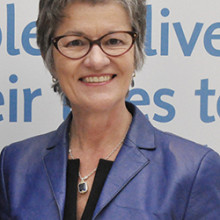For Wayne Kristoff, the possibility of getting off all medication for his type 2 diabetes was so intriguing he jumped at a chance to participate in an innovative trial in London. The REMIT study aims to induce remission of the condition – an exciting new concept being tested by researchers at Lawson Health Research Institute.
Kristoff was diagnosed in June 2014, which was difficult but not unexpected because there is a history of the illness in his family. He had to work his way up to taking four pills a day for his diabetes, which came with significant side effects. “If there was a way to get off medication, I wanted to be part of it,” says the 68 year-old.

He met the study criteria and was enrolled in February 2016. The results, so far, have been life changing for the Londoner. Since May 2016 Kristoff (right) has been off all medication, his blood sugar levels are good, and he has more energy and feels better than he has in years. He’s also lost 30 pounds thanks to the support offered by the research team.
“I remember well where I was and what I was doing when I received the call telling me that I could stop taking all of my diabetic medication,” adds Kristoff.
A second REMIT trial is now being launched, providing another opportunity for individuals with type 2 diabetes to take part. The trial challenges traditional type 2 diabetes treatment by testing an aggressive approach in recently diagnosed patients. St. Joseph’s Hospital in London is one of seven Canadian sites taking part in the landmark REMIT study. Being led by the Population Health Research Institute (PHRI), a joint institute of McMaster University and Hamilton Health Sciences, the trial follows a PHRI pilot study of early aggressive treatment that resulted in up to 40 per cent of 83 patients with type 2 diabetes going into remission and not needing any diabetes treatment for at least three months.
When Lawson launched the initial trial in December 2015, it generated a surge of interest with more than 200 people with type 2 diabetes asking to participate.
“The idea of remission in type 2 diabetes is obviously captivating to both patients and clinicians,” says Lawson researcher and endocrinologist Dr. Irene Hramiak, Chief of the Centre for Diabetes, Endocrinology and Metabolism at St. Joseph’s. “This overwhelming interest in the REMIT trial tells me that patients want solutions that will optimize care and reduce the complications associated with this disease.”

The standard treatment for people diagnosed with type 2 diabetes is to start on a single medication, which is then followed by the addition of more drugs and insulin as the disease progresses, explains Dr. Hramiak. In the REMIT study, patients undergo an experimental intensive treatment - two diabetes oral medications plus insulin at bedtime - for three months to see if remission can be induced and how long patients can go without any medication.
“By being proactive with aggressive treatment early on, the theory is that we may slow the progression of the disease,” says Dr. Hramiak. “We are attempting to actually change the disease and induce remission, which is a significant departure from the current approach.”
Those who would like more information about the trial can call 519 646-6100 ext. 65373.


